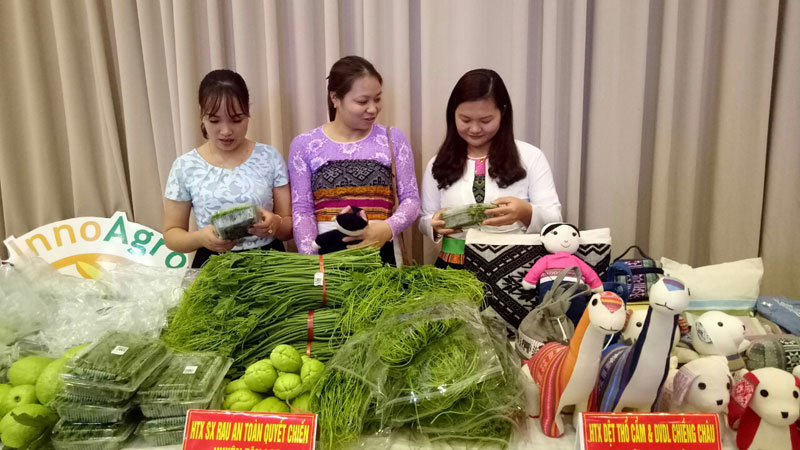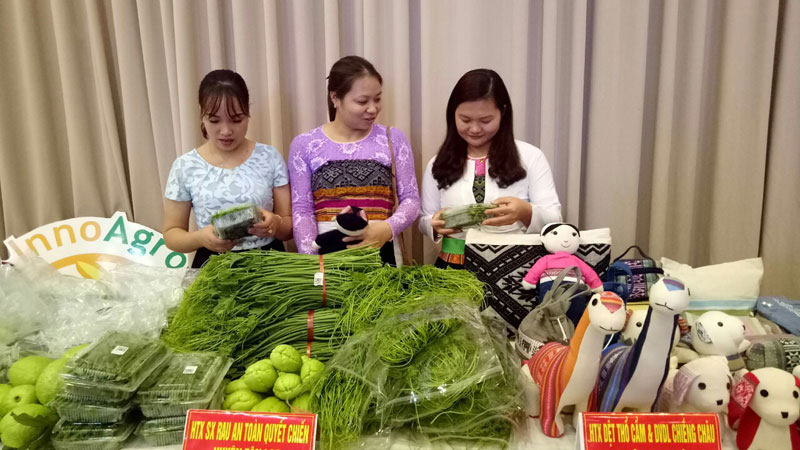
(HBO) - The preferential nature for the highland of Quyet Chien commune (Tan Lac) has made the chayote grow well, so the chayote is available all year round and it being confirmed as the safe vegetable in the market. Currently, the area of chayote trees in Quyet Chien commune is 60 hectares, mainly concentrated in Bu, Bac Hung and Ca hemlets. The households who cultivate a lot have from 1 to 2 hectares of chayote, and those who grow at least have 500 square meters of chayote.
![]()
The chayote products of the safe vegetable producing cooperative in Quyet Chien (Tan Lac), which are trusted by consumers, are promoted at fairs which are trusted by consumers.
The development of chayote is suitable in cool climatic conditions and it is easy to care for. It doesn’t have many pets, mainly using organic fertilizers without chemicals. This is a great advantage to compete with other vegetables. Quy Chien chayote is highly appreciated by consumers for its quality and it is crispier than the other chayote grown in other regions.
Due to the demand of the market and the demand for the legality, the households have gathered resources, land for production and the establishment of cooperatives in 2017 has marked the new development of the chayote, helping the output of chayote to be gradually stable with the competitive price, bringing good signals to the farmers.
With the safe quality of VietGAP, the sufficient labels and the packages, the products of the cooperative’s chayote have reached large markets, being favored by consumers. The major distribution units such as VinEco Agricultural Investment Development and Production Co., Ltd and some supermarkets, fresh vegetable shops in Hanoi Capital have been officially signing the orders. The clean vegetable products produced by the members are significantly improved in value thanks to VietGAP certification. The preliminary treated vegetables is sold to the cooperative with a price of 6,500 VND/ kg. During the 7 months of collection (from April to November), VietGAP chayote produces 63 tons/ ha with the average income of about 400 million VND / ha. The production and consumption of VietGAP vegetables of the cooperative are also stable, creating the confidence for the farmers in the production and attracting more and more members.
After participating in OCOP products, the cooperative wants to be supported to expand the area of planting chayote, applying VietGAP standard in production process and building a storage warehouse. At the same time, it is necessary to support the trade promotion and expand the market.
According to data from the Hoa Binh Provincial Party Committee, the industrial production index for the first six months of 2025 is estimated to have increased by 20% compared to the same period last year. This marks the highest year-on-year growth rate for this period since 2020.
In the first six months of 2025, Hoa Binh province’s export turnover was estimated at 1.145 billion USD, marking an 18.11% increase compared to the same period in 2024. Import turnover was estimated at $ 804 million, a 17.15% increase, which helped the province maintain a positive trade balance.
The lives of the ethnic minority farmers in Tan Lac district have gradually improved thanks to the new directions in agricultural production. This is a testament to the collective strength fostered through the professional associations and groups implemented by various levels of the district’s Farmers’ Union.
With the motto the "product quality comes first,” after nearly one year of establishment and operation, Muong village’s Clean Food Agricultural and Commercial Cooperative, located in Cau Hamlet, Hung Son Commune (Kim Boi district), has launched reputable, high-quality agricultural products to the market that are well-received by consumers. The products such as Muong village’s pork sausage, salt-cured chicken, and salt-cured pork hocks have gradually carved out a place in the market and they are on the path to obtaining the OCOP certification.
In the past, the phrase "bumper harvest, rock-bottom prices" was a familiar refrain for Vietnamese farmers engaged in fragmented, small-scale agriculture. But today, a new spirit is emerging across rural areas of Hoa Binh province - one of collaboration, organisation, and collective economic models that provide a stable foundation for production.
Maintaining growing area codes and packing facility codes in accordance with regulations is a mandatory requirement for agricultural products to be eligible for export. Recently, the Department of Agriculture and Environment of Hoa Binh province has intensified technical supervision of designated farming areas and packing facilities to safeguard the "green passport" that enables its products to access international markets.



